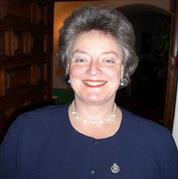Ann Packard explores Culture as the 'social glue' in society, and the value it adds to External Relations in Scotland
The impressive central Edinburgh venue – the French Consulate and Institut Francais d’Ecosse - generously donated for this RSA Fellows’ Media, Creative Industries, Culture & Heritage Network event - evidences Culture Adding Value to External Relations. That the Consul-General of France in Scotland is an RSA Fellow demonstrates the importance attached to his culture brief as Institute Director.
By the same token, the fact that delegates from several countries heard speakers from Austria, Ireland, England, Italy, France, Germany, Scotland and the USA also bears evidence to the importance each speaker, both personally, and, as relevant institutionally, attaches to such Adding of Value. Scotland’s contributors included distinguished Fellows of the Royal Society of Edinburgh Dr John Francis and Sir David Edward, Creative Scotland’s CEO Janet Archer and Mark Muller Stuart QC. Mark is the UN’s lead Senior Mediation Advisor to the UN Special Envoy to Syria, Staffan de Mistura, in the Syria Peace talks in Geneva. He is also the Founder Director of Beyond Borders, on whose imaginative, purposeful and ambitious proposal for a special unit in government, to add prestige to Scotland’s External Relations “profile”, Fellows might reflect and comment. It is hoped to set up another meeting for him to address Fellows in more detail.
Culture, in the vernacular and the widest of definitions, might be described as “social glue”. It self-evidently offers a diversity of employment. It offers opportunities to work between generations, creeds, nation states (and countries and regions within states), disciplines, races, genders, governments, civic bodies and institutions and every other “between” imaginable. Could, therefore, the proposed unit, elaborated a little below, become a globally significant “between” in our volatile world?
Culture is life and skills enhancing, and health and economy sustaining. The Creative Industries Federation’s 30th November 2017 figures indicate a UK economy contribution of £92 billion. SHEA 2016 indicated that the Historic Environment contribution to Scotland alone stood then at £2.3bn (being c. 1.5% of the total spend in Scotland, supporting also 55,400 full time posts direct and induced). Add to this the cited (2015) overnight and day visitor value of tourism of £8.9billion (14.6 million visitors) which includes elements of Cultural Tourism and the economic and societal impact of culture is significant and demonstrable. Tourist spending also generates c. £12billion in the wider Scottish supply chain (c. 5% of total Scottish GDP).
And add to this Creativity: The Future of Jobs report, published at the World Economic Forum Annual Meeting, 20-23 January 2016 in Davos-Klosters, showed that, in a list of the top ten most important skills for businesses, creativity is set to move from tenth place in 2015 to third place by 2020. Together, therefore, culture and creativity are often truly empowering and collaborative, as initiatives mentioned on 24th November demonstrate. Some will be evidenced in the future collation of available texts, availability to be advised in due course.
Between the “Provocations” listed below and the Q&A and Networking sessions over coffee and lunch, the range of topics was wide. It included ethics, linguistics, civic society, rights and responsibilities, communities and resilience, engagement between state and citizen, peace initiatives, interpretations of Soft Power (see also Portland Soft Power Index), legal tradition and precedent, art forms, science (ranging from bio-diversity to water science and thus public health), creativity, the built and natural heritage and many others, including, importantly, the 2018 Year of European Cultural Heritage. Graham Bell of NECT is an RSA Fellow and UK Co-Ordinator and can provide an events information upload template.
Outcomes from the event have already included one or two actual or potential collaborations, invitations extended to represent the RSA at other events, invitations to speak at other events in mainland Europe, and clear support for the United Kingdom to sign the UNESCO Convention for safeguarding Intangible Cultural Heritage (passed by its 2003 General Conference).
To this should be added the proposal by Mark Muller Stuart QC of Beyond Borders that the time is now right for a special unit, with its own budget line, to be established by the First Minister, to help support Scotland’s growing contribution in the field of conflict resolution, peace-making and international rule of law building. The unit might be developed by and through non-state soft power institutions such as Beyond Borders, which have used cultural diplomacy and Scotland as a platform to good effect to encourage dialogue and exchange between regions, nations and groups around the world who are either involved in conflict or experiencing difficult political transition.
As I write this blog, and review my reference to culture as “glue” in its widest sense, it would seem to me this proposal would build well on both the existing respected work of Beyond Borders and the international mediation work to which Mark Muller Stuart has contributed extensively, and to which he is so committed. It might well help position, or better re-position, Scotland’s role in the world and afford a source of demonstrable international expertise and leadership.
The MCICH Network – which designed and delivered this event - owes a genuine debt of gratitude to the speakers and to all those who helped fund this event, allowing the RSA to welcome guests and delegates from various countries. And in an extra cultural “twist” the vote of thanks was given by a delegate with links to both Canadian and Indian cultural activities. The delegate pack showing sponsors and speaker biographies is available as a pdf on application to MCICH Network chairman Ann Packard via Networks@rsa.org.uk
H.E. Dr Martin Eichtinger (Austria):
Culture: A Core Element of Austrian Foreign Policy
Consul General Dr Mark Hanniffy (Ireland):
Cultural Diplomacy and Global Engagement: A View from Ireland
Dr Eutimio Tiliacos (Centesimus Annus Foundation, Vatican City):
Culture as Mediator and Facilitator of International Relations in the digital Age
Dr Rupert Graf Strachwitz FRSA (Maecenata Foundation, Germany): Culture - More than an Added Value!
Dana Linnet (USA): Cultural Diplomacy:
Soft Power and Beyond
David Fajolles (Europa Nova Board Member, France):
National Agendas and European Cultural Strategies in External Relations: Time for a Re-balance?
Graham Bell (NECT [England], Europa Nostra & The Renaissance Foundation, Hungary):
Ties that Bind
Janet Archer (Creative Scotland, Scotland):
A Creative Scotland Perspective
Dr John Francis FRSGS FRSE, FRZSS (Scotland):
UNESCO: The Idea and Thereafter – whatever next?
The Rt Hon Sir David Edward KCMG QC FRSA FRSE (Scotland):
Law as a Reflection of Culture
Mark Muller Stuart QC FRSA (Scotland):
Understanding and Using Culture to Negotiate Peace and Transform Conflict
Related articles
-
How RSA Fellows are uniting to tackle Covid-19 challenges
Richard Caldecourt
RSA Fellows are setting up social and community projects to tackle the innumerable issues caused by coronavirus. Find out how you can get involved.
-
The Independent Music Conversation: Creating a Network to Support Independent Grassroots Music
Dr Sue Oreszczyn Dr Neil March
FRSA Dr Sue Oreszczyn and FRSA Dr Neil March invite fellows at the RSA who would like to join them in a conversation about how to support grassroots independent artists and their environment.
-
Communities Creating Homes
David Palmer FRSA
David Palmer FRSA lives just outside Abergavenny, and since 2012 he has been the Co-operative Housing Project Manager working across Wales to promote social, financial and digital inclusion through a range of projects.



Join the discussion
Comments
Please login to post a comment or reply
Don't have an account? Click here to register.
This was a superbly thought-provoking and positive event and the energy and commitment to culture as the language of engagement was inspiring. Like Peter, I found Mark Muller Stuart’s words to have a particularly searing relevance. Here’s to us all in delivery of this goal.
At one time, Scotland punched above its weight as its countrymen took leading roles in the building of empire. In that context, 'punching' is not an inappropriate term. In an era when global peace, justice and wellbeing are imperative, Scotland is once again in a position to take a leading role, this time finding its vocation in its cultural profile. Mark Muller Stuart's proposal is genuinely inspiring.
Peter Stott